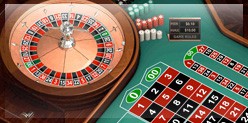
New Jersey Gambling License Renewal Deadline Approaching [...]

TRY THESE POPULAR GAMES:
- June 21, 2017 By Riley Wilson -

The Gambler’s Fallacy explained.
Although unpredictability is the true appeal of the games of chance and the unknown is what pumps up the adrenaline for most of us, there is a certain portion of enthusiasts who can’t seem to give up the idea of strategy and control, not even when it comes to Roulette, the game designed to incarnate the very concept of randomness.
Belief in a certain order of things and an illusion of control is of course an inevitable part of human existence and many feel that The Gambler’s Fallacy is no more than a flawed philosophy, extended to the wheel and the ball. Placing the series of random and unconnected events into a certain pattern is in the root of The Gambler’s Fallacy, but how much of the concept has any true value and is it actually possible to predict or at least narrow down the odds, is the question that has haunted the generations of gambling experts. In other words, does the wheel have a memory or are we just kidding ourselves?
The notion behind the Gambler’s Fallacy is that the frequency is closely connected to the probability. If a certain event has a higher rate of occurrence within a designated time period, it is less likely for the same event to keep happening over the course of time. The same concept works inversely – the longer the expected outcome was absent, the higher the probability it will start happening soon.
Although we often encounter this type of philosophy in various aspects of our life, Roulette is where the Gambler’s Fallacy is most comfortably settled. Interestingly enough, the very core of the Fallacy is denying the very core of Roulette – randomness.
Putting it very plainly, players who devote to this set of believes, feel that if a certain situation took place for more than an expected number of times, it will soon come to an end and be replaced with a different type of situation. The conclusion is based on a mathematical assumption of a numerical balance. If, for example, you decide to toss a coin, you start with an assumption that there are 50/50 chances of the coin landing on either side. Every landing of the coin on one side will in theory increase the chances of the coin landing on the opposite side. In reality however. It can happen that the coin lands on the same side every time it is tossed, even if we toss it 50 times in a row.
Roulette is the game where Gambler’s Fallacy has the highest potential of being exploited. Numerous track boards, charts and Hot and Cold numbers are all praying upon the innocent souls who place their faith into a higher order in the world full of random occurrences. But is that really the case? Experts who are utterly against Gambler’s Fallacy argue that every turn of the wheel is independent, but there are still others who claim that the laws of mathematical probabilities should not be disregarded – the very same laws that govern the Roulette wheel, whether we like it or not.
Even those who frown upon the The Gambler’s Fallacy agree that the ball as well as the numbers conform to the higher authority of mathematical probability – the discord between the two ideas may come from the number of occurrences within the group. The only way to predict the odds and the resting position of the ball is to conduct a survey on the large group of wheel spins and then draw your conclusion and form a pattern. On the other hand, one can also argue that since large group is no more than a structure consisting of smaller groups, same rules are applicable – what works for one will work for the other.
Therefore, is it not safe to assume that The Gambler’s Fallacy is just a slanderous name for (perhaps) a superficial grasp of the all governing laws of mathematical probability? Maybe the entire concept got a bad reputation simply because it came dangerously close to the truth, threatening to unveil that there is no such thing as the perfectly random wheel and that every little thing, including the Roulette and chance must yield to the laws of physics and mathematics? Not to mention the self-correcting principles integrated into the wheel design that contribute to the balance of the game, adding credibility to the Gambler’s Fallacy. Suffice to say that every system can be beaten one way or another and that nothing is flawless – be it the structure you are trying to disassemble by locating its weak spot or the strategy you use in order to do so. It just takes time.